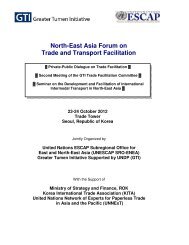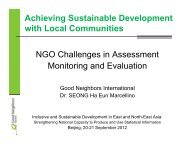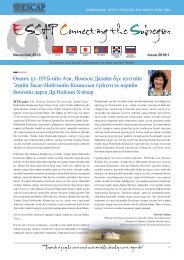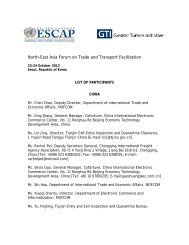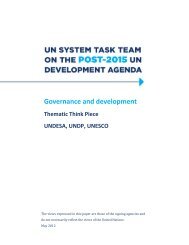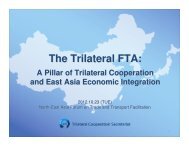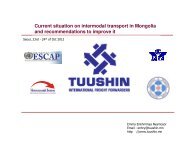Full Report - Subregional Office for East and North-East Asia - escap
Full Report - Subregional Office for East and North-East Asia - escap
Full Report - Subregional Office for East and North-East Asia - escap
Create successful ePaper yourself
Turn your PDF publications into a flip-book with our unique Google optimized e-Paper software.
MACROECONOMIC PERFORMANCE AND POLICY CHALLENGES AT THE SUBREGIONAL LEVEL CHAPTER 2<br />
Figure 2.14. Inflation in South-<strong>East</strong> <strong>Asia</strong>n economies, 2010-2012<br />
20<br />
18<br />
16<br />
14<br />
12<br />
10<br />
8<br />
6<br />
4<br />
2<br />
0<br />
Brunei<br />
Darussalam<br />
Cambodia<br />
Indonesia<br />
Lao People's<br />
Democratic<br />
Republic<br />
Malaysia<br />
Myanmar<br />
Percentage<br />
Philippines<br />
Singapore<br />
Thail<strong>and</strong><br />
Timor-Leste<br />
Viet Nam<br />
Sources: ESCAP, based on national sources; <strong>and</strong> CEIC Data Company Limited. Available from http://ceicdata.com (accessed on 30 March 2013).<br />
Note: Data <strong>for</strong> 2012 are estimates.<br />
2009 2010 2011<br />
People’s Democratic Republic benefited from lower<br />
food <strong>and</strong> fuel inflation.<br />
In addition, labour market <strong>and</strong> wage policies could<br />
affect inflation. In Thail<strong>and</strong>, inflation expectations<br />
could rise as the application of higher minimum<br />
wages is extended to all provinces in 2013. In<br />
Malaysia, the nationwide introduction of minimum<br />
wages in January 2013, <strong>and</strong> in July <strong>for</strong> smaller<br />
business enterprises, could add to price pressures.<br />
However, given the moderate core inflation in<br />
these countries, the concern has been more on<br />
the impact on employment rather than prices. In<br />
Singapore, where inflation remains above-trend,<br />
the Government’s ef<strong>for</strong>ts to enhance productivity<br />
through tightening the inflow of <strong>for</strong>eign labour could<br />
elevate labour costs, at least temporarily, <strong>and</strong> thus<br />
core inflation. In the Lao People’s Democratic<br />
Republic, it is expected that inflation will edge up<br />
in 2013 due to an across-the-board increase in<br />
public sector wages.<br />
Another factor affecting inflation could be changed<br />
in administrated prices <strong>and</strong> taxes. In Malaysia, a<br />
government ef<strong>for</strong>t to rationalize fuel price subsidies<br />
continued in 2012, with the price of premium petrol<br />
having been adjusted upwards by about 11% in<br />
September. However, the inflation impact has been<br />
quite modest. The introduction of a goods <strong>and</strong><br />
services tax could push up inflation expectations.<br />
In Indonesia, the price prospect is highly sensitive<br />
to possible changes in administrative prices; <strong>for</strong><br />
instance, in the budget <strong>for</strong> 2013 a 15% increase<br />
in electricity prices has been proposed.<br />
Inflation can also be induced by excessive liquidity<br />
<strong>and</strong> high government spending. Inflation in Viet<br />
Nam declined significantly from 18.7% in 2011<br />
to 9.3% in 2012, under the Government’s ef<strong>for</strong>t<br />
to stabilize the economy from the side effects of<br />
earlier expansionary policies. However, inflation still<br />
remained high in health services, education <strong>and</strong><br />
transport, leaving average households exposed to<br />
large price increases. In Singapore, price pressures<br />
have generally been fuelled by low global interest<br />
rates that drove up domestic property prices. In<br />
Timor-Leste, strong dem<strong>and</strong>-side pressure from<br />
rapidly rising government spending continued.<br />
123



